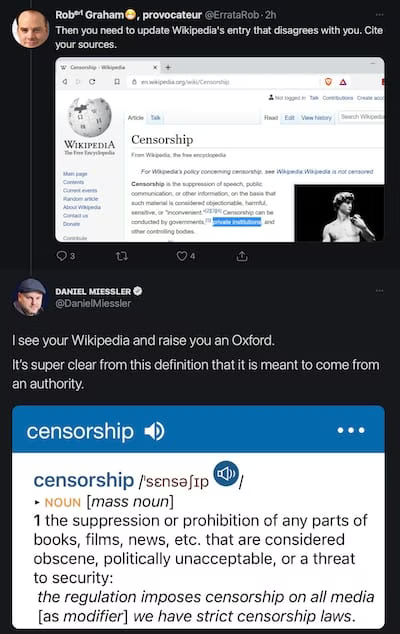The Line Between Choosing Your Own Customers and Censorship

I tweeted something today about AWS kicking Parler off its platform > this week, and it turned into a whole thing.
Rob is a buddy of mine, and we ended up texting about the issue later in the thread as well.
You can read the whole thread above, but Rob was basically arguing that any influence—private or government—to limit speech is censorship. Which I just don’t agree with.
Maybe it can sometimes be desired censorship, or attempted censorship, but true censorship requires both authority and impact, as I would argue we can see from Oxford’s definition here.

A definition dance-off
If you can easily take your ball and go somewhere else you’re not being censored. For example, it’s not censorship for a small, private art gallery to decide not to show your piece in their upcoming event.
Why not?
Because there are other art galleries. And it’s not like the gallery is run by the government and they called every other art outfit in the country and told them not to carry you. If that were the case, it would be censorship.
Book publishers are another example. Are they required to publish everything that gets submitted? Or do they get to choose?
Publishers choose all the time not to publish someone because they don’t agree with their stance. That doesn’t make them censors because they’re one of many.
So AWS saying no is not really a big deal unless they represent some sort of authority that controls others. Traditionally that has meant government or religion, which is where this all comes from.
In short, censorship requires centralized, large-scale impact to someone’s ability to get their message out. In the old days that meant libraries, radio stations, MTV, etc., which were being influenced by a government or Christianity to not carry something.
AWS not hosting someone when they can go many other places to get the same service—which users don’t even see anyway—doesn’t apply.
And before anyone asks, yes, I do see a potential risk of a slippery slope where a denylist is set up and we start seeing bans across multiple platforms for any view that deviates from the current in-crowd narrative.
But there’s the small matter of that Parler-shaped slippery slope storming the capitol building this week.
In other words, I have a sneaky suspicion that all this activity is related to an extremely recent kinetic attack on our democracy rather than some amorphous and impending slippery slope from the left.
Sure, we should remain vigilant against that, but let’s start by keeping control of our government buildings.